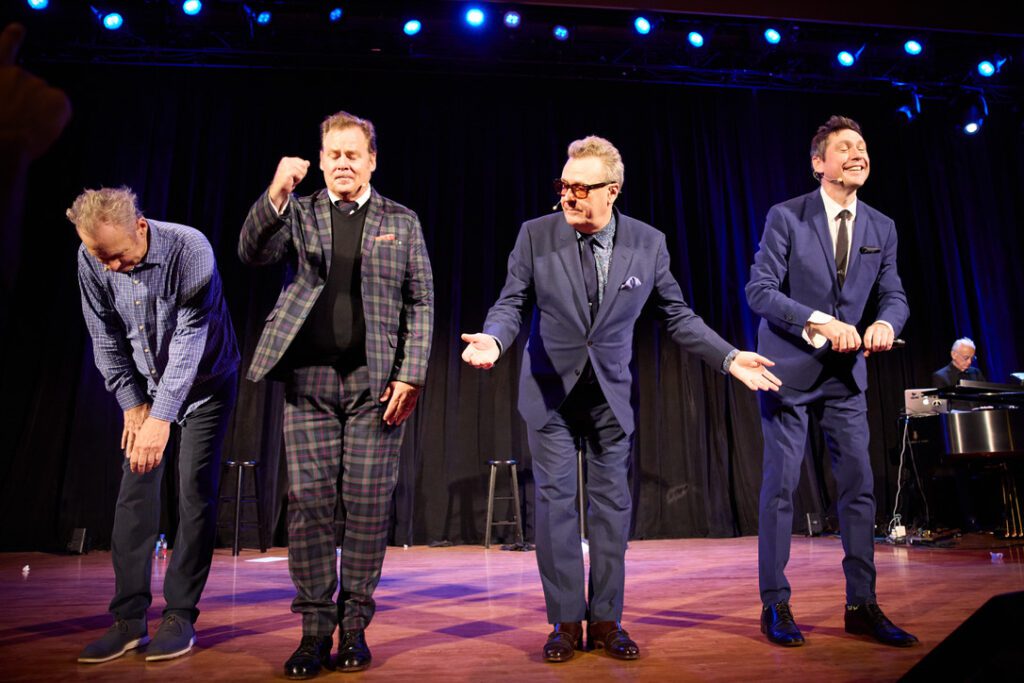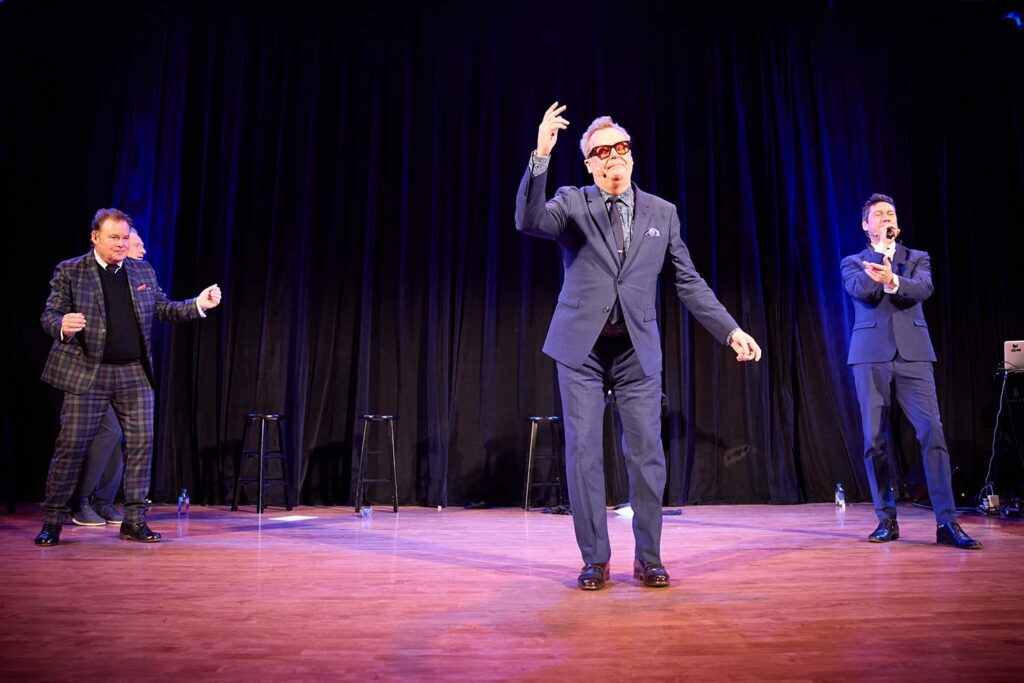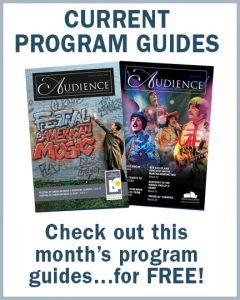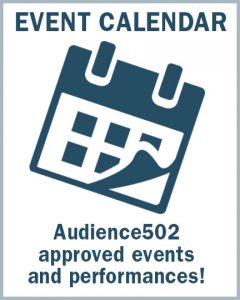“Whose Line is it Anyway” is an improv TV show adapted from a British show of the same name. It first aired in America in 1998 and has been popular ever since. Hosted by household names like Drew Carey and Wayne Brady, it features a group of actors and friends taking suggested themes from audiences and featured guests, and acting them out on stage.
In Whose Live Anyway coming to the Brown Theatre on April 2, cast members Ryan Stiles, Greg Proops, Jeff B. Davis, and Joel Murray will leave you gasping for air at the witty scenes they invent before your very eyes. Audience participation is key, so you might be asked for suggested themes or even to join the cast on stage.
We caught up with Proops, an actor-comedian who has appeared on many of the televised shows and is now immersed in the Whose Live tour, to talk about what we can expect from the show.
Listen to the full interview below:
Doug Dreisbach: We can’t wait to see you and the crew here in Louisville on April 2. Your show has been a great success, and the adaptation to a live setting is going to be really fun to watch. You have your hands full with a lot of projects, in addition to “Whose Line” and Whose Live. You’re doing stand-up gigs, podcasts and more. Where do you get your energy to do everything? And do you gravitate to some of these projects more than the others? How do you divide Greg into so many pieces to do all these different things?
Greg Proops: Thank you for having me, and I am excited about coming back to Louisville, too! Lately, I’ve been very unambitious, but having said that, I did a stand-up album over the new year in San Francisco and am putting it all together now, and then we will go back on the road with Whose Live for the whole year soon, so I am preparing for that as well. We did 100 days last year so it takes a lot of me. And then, of course, I have the podcast that I do with my wife, “The Smartest Man in the World,” and the film club that my wife programs, called the “Greg Proops Film Club.”
But with Whose Live, we have so much fun and I am very excited to be back on the road. I love working with the fellows on Whose Live because we improvise every night, and we make up a new show, and we sing, and we can go and make cracks and all that. When I do stand-up, I can say what I like, and when it’s the podcast, I can kind of get my own opinion out. I also love the movies and the film club, because we can talk about old movies, and that is always fun. So, I try to keep myself interested.
DD: How do you come up with your content for stand-up, podcast topics, and other projects? Do you have a think tank, or do you and your buddies come up with things?
GP: I generally go with topical subjects like where I’ve been, what I’m thinking, how I’m feeling, and how I perceive the country is feeling about things. The album that I just did, I improvised it, but I did one in 2018 that was strictly written. I didn’t tell anyone I improvised the album before, but lately I’ve been telling everyone, since evidently everyone thinks it’s a big deal. I go in with a bunch of ideas and things that are happening in the world and places I’ve been and whatnot, and then I, if you’ll pardon the expression, as we say in jazz — I riff on them.
Because I’ve been around a long time, I can articulate fairly well what I want to do, and then over the course of four or five nights, I am able to put an album together using all the best parts and the way that I’ve said it the best. Then I can take that material and hone it down, memorize it and put it in some sort of semblance of an order.
DD: When you go on stage, do you have an idea of the order of topics you’re going to do? Do you script any of it prior to going on stage?
GP: I try not to think about the audience too much. I mean, obviously, I do care about what the audience thinks, but on the other hand, if you don’t do it for yourself, you’re not doing it for the right person. You must care somewhat what they think because you want them to laugh and be participating. But you also can’t write just for the audience. Otherwise, I think you lose yourself. You have to do what you want.
On the night, you get a pretty fair read of whether they’re getting it or not, which is the immediacy of stand-up comedy and all comedy. If they’re not laughing every 15 to 30 seconds, or whatever, you know that it’s not happening. So, that’s how I sort of gauge it. Also, I’ve been making albums in San Francisco, which is kind of my hometown and my home base. I don’t live there anymore, but it’s certainly a place that I love and lived there a long time, so I have a reasonably good idea of what’s going to happen.
But again, I think trying to make mistakes and incorporate some of those mistakes into the comedy and then into a craft is the whole saga. Like with improv, you don’t know what’s going to happen. Sometimes you mess up. But sometimes when you mess up, it turns out better than what you thought you were going to do.
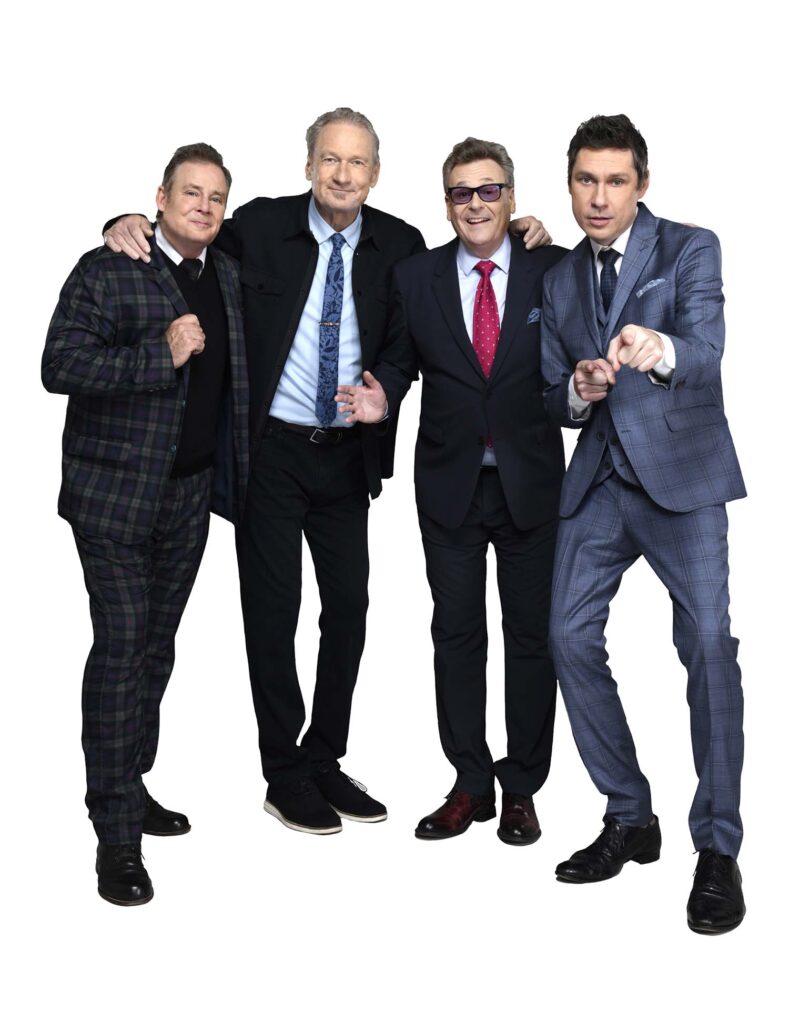 DD: How did you originally get involved with the TV show, “Whose Line is it Anyway?” And has it progressed the way you thought it would when you first were approached, or you approached them? How did all of that happen?
DD: How did you originally get involved with the TV show, “Whose Line is it Anyway?” And has it progressed the way you thought it would when you first were approached, or you approached them? How did all of that happen?
GP: I’m going to answer the last part first. I had no idea that it was going to be like this. I got on the show in 1989. A friend of mine, Mike McShane, had done this show the year before. (The show originally aired in the United Kingdom before coming to America). They’d come to San Francisco and audition, because our producer, Dan Patterson, loves Americans, and he went to school in Chicago, so he made sure that he brought his group out to audition us in America. So, of course, when they added me, Ryan, Mike McShane, Colin Mochrie, Chip Estin and all that to the group, it changed the flavor of the show. It made it a little more international because we were on English TV for like 10 years.
So, that was 1989 and now I find that we’ve taped a whole new season of “Whose Line” for the CW. I think it’s our ninth or 10th season. I’m not kidding. So, we’re way over 30 years into this, and I don’t think, when you start doing a TV show, that you think it’s going to last 30 years because they never do. I mean, I don’t think anything’s been on for over 30 years, except maybe the “Today Show” or the “Tonight Show.”
GDD: For anybody who hasn’t seen the show, it’s basically improv situations where your host is talking about the topic, and then you get input from the audience, and you act out a scene. Is that pretty much the gist of it?
GP: I’d say it’s a bunch of jerks playing charades, but yes, that’s a fairly good summation of it, yeah.
GDD: Can fans expect something similar on stage to what they see on television? Or is it something different? Will you get some audience members to participate? How is it going to work?
GP: We absolutely bring people out of the audience. We bring people out and sing to them. We bring people out, and they have to move us around on stage. We bring people out to do sound effects, where they have to provide all the sound effects in the scene. We improvise everything we do. Everything we perform on stage is based on a suggestion we get from the audience, so we’re not generating the ideas for the scenes.
Also, there is not a big pane of glass between you and us like there is on TV. It’s a lot more immediate. We’re standing there right in front of you. So, sometimes people will sit in the front row, and I’ll call on them and say, “Do you have an idea for this or this?” And they’ll look at me and go, “Oh, my God, I didn’t know you were going to say something to me!” And it’s like, “You’re at the front row of an improv show, so you’d better be ready to go!” If you come to our show, if you don’t want to participate, sit in the back, because if you sit in the front, you’re going to get called on, and we’re going to ask you for stuff. That’s how that works. The audience is as much part of the show as we are, and we’re totally dependent on everybody for ideas for songs and sketches.
If we say, “What’s a job someone might do?” or “Where is a place people might meet?” and we say it to someone in the audience, and they go, “I don’t know,” you’re like, “Whoa, that doesn’t work.” Also, you might want to wear something that you like, because if we call you on stage, you’re going to be in front of everybody, so maybe you don’t want to be wearing sweatpants and Crocs.
GDD: That’s not a fashion statement in L.A.?
GP: It’s a fashion statement everywhere. As Don Rickles, the late, great comedian once said, “People come to this show in their underwear.” We all dress up, so I’m a big fan of dressing up to go out. You wear what you like, but I’m just saying, if we pull you on stage, and you’re wearing that last shirt that you pulled out of the laundry, you’re not going to be that happy.
GDD: Are there any improv situations that you personally love, or that you hate to do, or despise, whether it’s making noises or doing different things?
GP: I love to sing. I’m not a trained singer. I’ve never taken lessons or anything. I don’t think I sing on key, but I think I’m really loud, and I’m pretty fearless. So, Ryan and I sing more than we do on TV. Jeff Davis sings. And we have Bob Derkach on, who’s our musical director, and he was at Second City Toronto for 25 years, and he’s a superb keyboard player. So, I like singing best of all. I think it’s really fun. We play a lot of the same games, but we mix them up. We change the order around of what games we’re in, so that we don’t get too bored or tired of doing anything.
On TV, we’ve been doing Hoedown forever, but we never did it on stage until a year or two ago, because Ryan really hates it. I mean, none of us love it because we didn’t think of Hoedown. Hoedown was one the producer thought of. But now, if you come to see us, it’s likely we’ll do a Hoedown for an encore on stage in Louisville. We try to get an encore every night. We’re out there swinging for the fences, so if we don’t get an encore, we’ll know the reason why.
GDD: Is it an unwritten rule for improv that you try not to laugh on stage? Sometimes you see the smirk come, and then it goes away.
GP: Oh, no, I never try not to laugh. I break all the time. I am the world’s worst. In England, they call it corpsing. In America, they call it breaking, and I just totally break all the time. I laugh at everything everybody does. I made up my mind years ago I was never going to be able to hold it together. If you remember the old “Carol Burnett Show,” I’d fill in the Harvey Korman slot.
GDD: Is there anything you’d like to add for the folks in Louisville interested in coming to the show?
GP: It’s a real audience-interactive show and it’s a lot more fun than it is on TV. The TV show is fun because there’s a sense of urgency and danger. You don’t know what’s going to happen. On stage, we bring people out of the audience, and it’s really all about you guys. We really try to focus on where we are and what we’re doing, so I think it’s totally worth your time. It’s not like any other comedy show you’re going to see. We come out swinging. We don’t drag on stage. We’re there to slay, as we say in comedy.
For tickets and more information, visit KentuckyPerformingArts.org
Interview by Audience Publisher G. Douglas Dreisbach
Photos(c) 2022 David Bergman
www.DavidBergman.net

